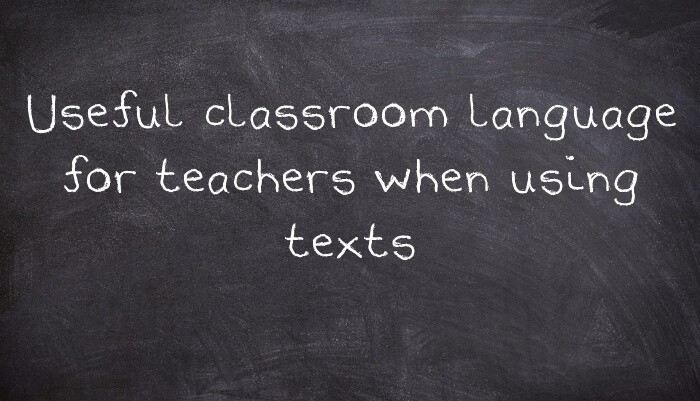Types of text
Brochure
Pamphlet
Flier/ Leaflet
Instruction booklet/ Manual
Signs/ Notices
Stories
Graded readers/ Easy readers/ Elementary level readers
Report
Fax
(Formal/ Informal) letter (of complaint/ application)
CV (= curriculum vitae = resume)
(Application/ Immigration) form
Contract
Junk mail (= Spam)
Website
Search results
(Online) forum
Subtitles
Interactive menu
Menu
Catalogue
Types of tasks
Multiple choice
True/ False
True/ False/ Not given
Matching (paragraphs to headings)
Summarizing
Prediction tasks
Guessing meaning from context
Gap fill/ Cloze
Put the... into order
Correct the wrong statements
Answer the questions
Fill in the table
Other useful vocabulary to talk about texts
Scanning
Skimming
(Reading for) gist/ general understanding/overall understanding
(Reading for) detailed comprehension/ specific information
Speed reading
Jigsaw text
Phonics
Whole word recognition
First letter recognition
Word shape
Paragraph
Topic sentence
Headline
Caption
(Paragraph) heading
Extensive reading/ Reading for pleasure
Self Access Centre/ School library/ Lending library
(Vocabulary) pre-teach
Underline
Classroom language for prediction tasks and other lead-ins
"From the headline/ the picture(s)/ the picture(s) and caption(s)/ what you know about the topic/ the first sentence/ the first paragraph/ the list of vocabulary from the text/ the paragraph headings, what do you think the text will say/ will be about/ will include? (Discuss with your partner)"
"Try to answer the questions from your discussion/ your own knowledge, then read through and check"
"Read through quickly and just check your answers"
"First we're going to look at some vocabulary that you might need to understand the text"
General tips for reading
"It's usually a good idea to read through the whole text first, but in this exam you don't have time"
"Don't worry about any words you don't know, just ignore them"
"Read through all the questions first"
"The questions are (almost all/ all/ almost always/ usually/ always) in the same order as the text, apart from the summary question/ attitude question"
"How do you think we should approach this task?"
"You have to write your answers on the answer sheet at the end, so you can write anything you like on the question paper"
"Take out the staple to make it easier to see the questions and text at the same time"
Tips for scanning
"Numbers and words with capital letters are the easiest things to scan for"
"What word from the question will probably be in the text and be easy to scan for?"
"Before you start scanning, whereabouts in the text do you think the information might be?"
Tips for multiple choice questions
"Underline the information in the text that tells you that option A is correct/ wrong"
"If there is the same word in the text, it doesn't necessarily mean that it is the right option/ it's probably a trick question"
"What word from this sentence means the same as this word in option B?"
"Cross off the options that you are sure aren't true (and then guess)?"
"You don't lose any marks for a wrong guess"
"Eliminate the (obviously) wrong answers (first)"
"Only change your answers if you are sure they are wrong, because most changes of multiple choice tasks are from something right to something wrong"
Tips for matching tasks
"If you have time, read through the paragraph that you haven't matched to any of the heading and make sure that it doesn't match any of them"
Tips for self study reading
"Don't stop and use your dictionary whole you are reading, because the meaning of the word might come up later"
"When you reach Advanced level it's worth having an encyclopaedia as well as a dictionary, because most of things you don't know will be cultural things"
"It's more important to read for pleasure than it is to try to learn the vocabulary"
"It's almost always better to read a graded reader than to read an authentic text"
Miscellaneous instructions and tips
"The text continues on the next page"
"Pens down the first time you read"
"You can/ can't write on the text"
"(Please leave five minutes, because) you need to transfer your answers to the answer sheet"
"Underline the information in the text"
Checking answers
"Where does it say that in the text? (What paragraph/ What line number?)"
"Does that mean (exactly) the same as...?"
"Choose any question you are sure of the answer for"
"Compare your answers with your partner"
"Check your answers with the answer key/ from the board and ask me if you have any questions"
Discussion questions/ thinking points for teachers
What do you think of the tips for students given above? Pick two you strongly agree with and two you disagree with.
